2nd Multi-Stakeholder Workshop on Sustainable Tourism in Ngapali
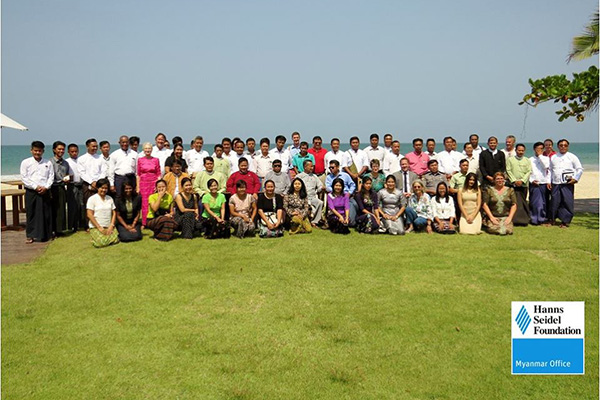
Participants of the 2nd Multi-Stakeholder Workshop on Sustainable Tourism in Ngapali.
HSF
It was attended by the Union Minister of Hotels and Tourism, H.E. U Ohn Maung, Rakhine State Ministers for Finance and Planning, U Kyaw Aye Thein, and Minister for Development Affairs, U Min Aung, Thandwe MP, U Win Naing, newly elected Chairman of Myanmar Hoteliers Association, U Aung Myo Min Din, and around 80 local stakeholders and tourism experts, including government officials, hotel owners and managers, restaurant and shop owners, fishermen, local villagers and environmental experts and other civil society organisations.
H.E. U Ohn Maung who was visiting Ngapali as part of a four day visit to Southern Rakhine State, his first as Minister, gave the opening speech and closing remarks. He welcomed the increasing numbers of foreign and Myanmar tourist arrivals to Ngapali, and its recognition as one of the best beaches in Asia, noting that ‘Ngapali and Mrauk-U are the two jewels of Rakhine State for bringing in tourists and contributing to the local economy. We need to manage tourism sustainably, minimize the negative and maximize the positive impacts of these visitors, and work together to make Ngapali a better place to visit and to live in.’
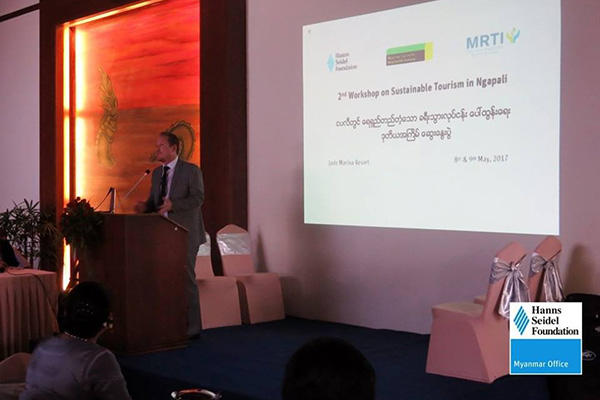
Mr. Achim Munz, Resident Representative of the Hanns Seidel Foundation (HSF) Myanmar opened the workshop. He emphasized that he likes to spend some of his holidays in Ngapali and intends to do so in the future. As such he urges the stakeholders to collaborate closely to tackle the trash issues that harm the reputation of Ngapali as a ‘world class destination’ to guarantee sustaining influx of tourists.
HSF
Workshop participants voted on their top concerns for tourism in Ngapali, as they had done in 2016. Environment remained the top - and a growing - concern, selected by 35% of participants (up from 29% in 2016). Rising up the list to 2nd place was lack of local participation in decision-making (16%). Solid waste management remained top of the environmental concerns, selected by 55% of participants (up from 34.5% in 2016), with sand mining in 2nd place at 18% (23.5% in 2016, also 2nd place).
Since waste management had also been identified by the Minister as the key challenge to be addressed before Ngapali’s runway could be extended to bring in more visitors, most of the workshop discussion focussed on this. Practical examples of addressing waste management were presented by U Saw Lwin, Chairman of Ngapali City Development Committee, who noted the municipality had acquired a new 3 acre landfill site for all users.
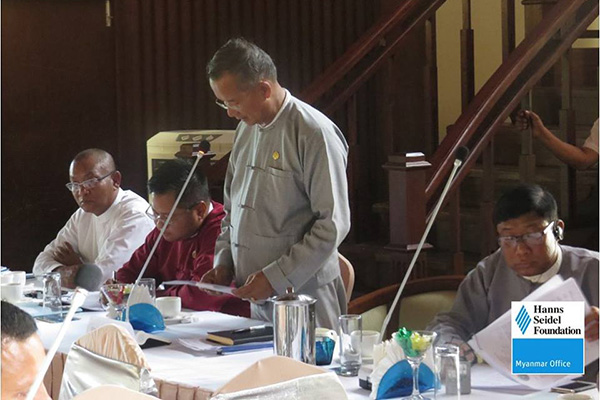
H.E. U Ohn Maung gave a final speech at the end of the 2 days workshop informing the attendants and media about the future plans of the Ministry. Also he said that there is no airport extension in Thandwe until the trash is slashed.
HSF
Other practical solutions brought forward as local youth leader Phyo Maung Maung, talked about the community beach clean up after the recent cyclone. ‘Carl’ Phone Kyaw Moe Myint of Trash Heros and Wendy Neampui of Chu Chu also presented their trash clean-up and recycling initiatives and offered support to civil society in Ngapali looking to address the trash problem.
Other environmental issues such as combatting sand mining and mangrove deforestation were also discussed, along with guesthouse licensing, human resources development, planning and destination management. MRTI briefed on their ongoing study of the risks of child sexual exploitation, with support from UNICEF, and with the approval of the Ministry of Hotels and Tourism.
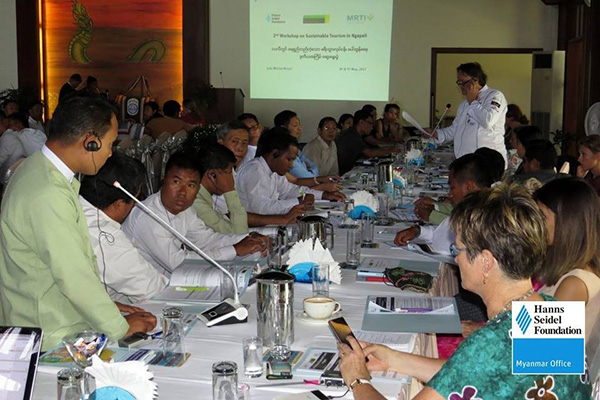
Lively Q & A sessions throughout the conference. Here a local resident questions a member of the Rakhine State Government about what the government intends to do to in terms of the accurate disposal of trash
HSF
Vicky Bowman, Director of Myanmar Centre for Responsible Business said:
”I was pleased to hear the Minister and the Chair of the Hoteliers Association say that plans would be accelerated for garbage collection from both the tourist areas and the villages to deliver it to a newly acquired landfill. Since our last workshop we heard that Steering and Working Committees for Ngapali Beach Sustainability have been created by the Rakhine State government. These will need to work closely with local businesses and residents to achieve a trash-free Ngapali, since tackling trash is everyone’s responsibility. Recognising this, the workshop participants made concrete personal commitments to reduce litter such as hotels cutting back on use of plastic bags and water bottles, providing bins and education campaigns in schools, and the need for local bye-laws and enforcement. MCRB, HSF and MRTI played a part too, working with Jade Marina Hotel to save over 200 plastic bottles by using water jugs at this workshop’.
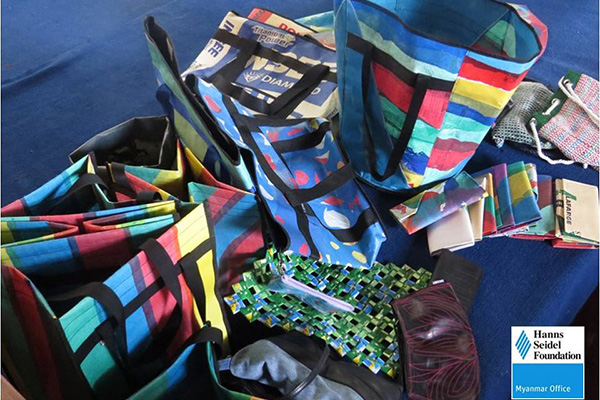
Recycled Products from Chu Chu. One of the many trash clean-up and recycling initiatives presented at the workshop
HSF
Achim Munz, Resident Representative Hanns Seidel Foundation Myanmar: ‘It was good to hear the Minister clarify that the 10 metre height limit for buildings close to the beach remains in place, not only in Ngapali but in seven other beach destinations in Myanmar. We also were pleased to hear him reiterate that there would be a clampdown by the local authorities on sand mining on Ngapali’s beaches. It is good to see that, one year on, the Union and State Government are working hand in hand to set out a vision for sustainable tourism in Ngapali, and tackle the urgent issues that have been of concern to local stakeholders’.
In a final statement late July the three organisations MCRB, MRTI and HSF concluded in terms of the next steps: in view of the fact that the workshop discussions consistently highlighted the need for local leadership to take forward the identified actions, MCRB, MRTI and HSF stand ready to support local stakeholders, as well as the MoHT, as they initiate any follow up, to the extent that support is needed from our side.
Please find the workshop report here: https://view.publitas.com/hanns-seidel-foundation-myanmar/workshop-report_multi-stakeholder-workshop-on-sustainable-tourism-in-ngapali/
